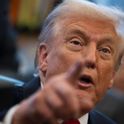Senator Elizabeth Warren is a populist, Democratic Party-style. She has long been an advocate for ordinary citizens against corporate interests. She was the brains behind the Consumer Protection Bureau, which—until the Trump administration de-clawed it—endeavoured to curtail the predatory ways of credit card providers. She’s introduced a bill which would force corporations to let workers elect 40 per cent of their boards and never tires of slapping down CEOs. At one congressional hearing, she told the head of Wells Fargo, a bank which illicitly opened accounts in its customers’ names without obtaining their permission, that he should resign: “At best you were incompetent, at worst you were complicit.” She pressed for Wall Street banks to be prosecuted, saying, “I'm really concerned that 'too big to fail' has become 'too big for trial'.”
Warren’s an intellectual, a lawyer, an uppity woman in the style of Hillary Clinton, and now she’s running for president.
The question is, though: do Democrats really want to nominate a 70 year-white academic from the Bernie Sanders School of New England progressivism? The 2018 midterm results suggest the African Americans, Latinos, and suburban women who are now the backbone of the party crave more youth and diversity. Beto O’Rourke, the congressman from Texas who nearly beat arch-conservative Ted Cruz for the US Senate in 2018, oozes charisma and speaks perfect Spanish. New Jersey’s Cory Booker, an African American, graduated from Stanford, Yale and Oxford. He’s made racial justice one of his signature issues in the United States Senate. O’Rourke is 46; Booker is 49. And with a Jamaican father and an Indian mother, Sen. Kamala Harris, 54, is a walking argument for American immigration. A former prosecutor and rock-ribbed supporter of reproductive rights, Harris comes from California, a rich source of Democratic primary votes.
Warren isn’t a fresh face the way O’Rourke, Booker and Harris are. She isn’t a cause celebre like Sanders, whose college student followers still think Clinton stole the nomination from him in 2016, nor would she exude Obama nostalgia like former Vice President Joe Biden, whose working class appeal might draw the Rust Belt back into the Democratic fold. Warren is sharper-angled, less affable, less like a cool grandparent and more like an admired, but also intimidating, university professor.
Nevertheless, Warren is a contender. She says she means to campaign on one central theme, that “corruption is poisoning our democracy.” Of course, every candidate is against corruption. Donald Trump ran on “draining” what he called “the swamp” of government graft, but he’s done little to address it. Warren is quite specific in her indictment of politicians who “look the other way while big insurance companies deny patients life-saving coverage, while big banks rip off consumers, and while big oil companies destroy this planet.” She also blames the right-wing media, that “echo chamber of fear and hate designed to distract and divide us,” especially Fox News and its fans in the White House.
This could be a winning message for the Democratic Left, a rallying cry for those for whom the much-touted “economic recovery” did not really improve their quality of life. Warren has diagnosed America’s illness, and just as she did with the popular Consumer Protection Bureau, has a slew of well thought-out prescriptions for it.
But being the smartest person in the room is not always a guarantee of success in the Democratic primary. Polls show that Warren has significant “negatives,” as the political consultants say. A recent poll by CNN showed her coming seventh out of ten potential Democratic candidates, behind Biden, Sanders, and others, while Politico posed the question: “How does Elizabeth Warren avoid a Clinton redux—written off as too unlikable before her campaign gets off the ground?”
Warren is not the most polished of political performers or the slickest of PR strategists. Her decision to release the results of a blood test showing that yes, she is indeed part Native American, blew up in her face, with everyone from the Cherokee Nation to fellow Democrats criticising her and Trump seizing yet another chance to belittle her as “Pocahontas.” But her fearlessness in the face of smug Republican entitlement has won her many fans amongst fed-up women, especially when Senate Majority Leader Mitch McConnell ruled her out of order, demanding she stop reading a letter from the widow of Martin Luther King during former Attorney General Jeff Sessions’s confirmation hearings. McConnell snapped, “She was warned. She was given an explanation. Nevertheless, she persisted,” and a progressive icon—along with thousands of t-shirts and bumper stickers—was born.
Can Elizabeth Warren go the distance?
The senator from Massachusetts has long championed ordinary citizens against corporate interests. Now she’s running for president
January 03, 2019

Photo: Sachs Ron/CNP/ABACA/ABACA/PA Images











